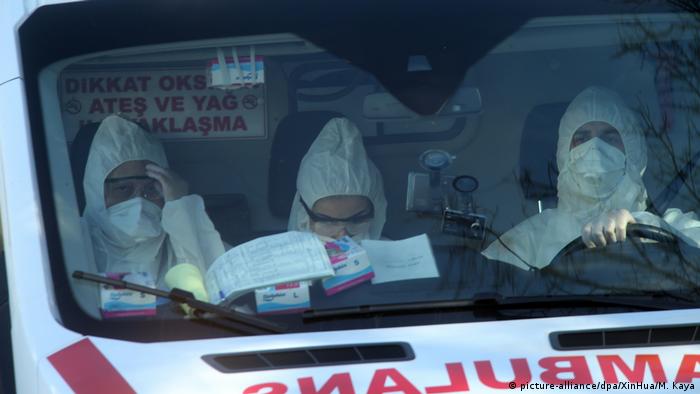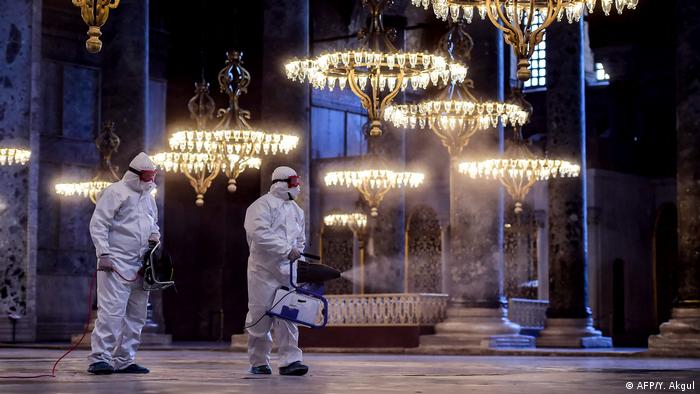The corona virus is also spreading rapidly in Turkey. The government assures the population that everything is under control. But doctors report enormous omissions in the fight against viruses.
Apparently, the Turkish government is serious about fighting the corona virus. And that is also the view in large parts of Turkish society. In fact, it took numerous measures: Schools were closed early, major events were canceled, the border to Iran, a country at risk, was closed, and even a curfew for seniors over 65 was decided.
The Turkish Minister of Health Fahrettin Koca informs the public of the current state of affairs on Twitter every day: He is happy to announce how many tests have already been carried out. Even the Turkish opposition, which is usually in a permanent clink with the government, appears satisfied with its crisis management.
Doctors paint a different picture
But not everyone is convinced by this picture. Deutsche Welle has spoken to doctors who treat Covid19 patients in Turkish hospitals. The doctors, who all want to remain anonymous, report enormous government failures and are very skeptical about the alleged coping with the Corona crisis.
"The problem is not the mortality of the virus. The problem is the overwhelming number of virus carriers. The number is growing so rapidly - even around the world there would not be enough medical equipment and breathing equipment to cope with this rush," complains a doctor.
Corona tests in short supply
Health Minister Koca, however, assures the population that enough tests are being done to determine the spread of the virus: "7641 tests have been done in the last 24 hours," he tweeted about Saturday evening.
However, numerous doctors point out that too little testing is being carried out: "90 percent of our patients are currently undergoing corona-specific therapy, but none of the patients has been diagnosed with Covid-19 before, as hardly any tests are carried out. Only one or two tests are allowed under 100 people, "says a doctor who works in one of the largest state hospitals. "Even if there are symptoms typical of corona, such as inflammation in the lungs, fever or cough, no tests are carried out." Accordingly, the undisclosed number of corona infected people in Turkey must be very high.
Even a general practitioner who was quarantined for ten days and who transmitted the coronavirus to women and children at home sees the small number of tests carried out as the main problem in combating the virus: "I talked to a doctor about my symptoms and the treatment planned, but a test was still not carried out. " In his sick leave he did not note Covid-19, but "back pain".
A porous quarantine
Another criticism of the doctors is that quarantine measures would not be observed. A hospital employee reports: "Those suspected of having Covid-19 are initially isolated from other patients in a separate section. But the relatives of the patients go in and out." One can hardly speak of quarantine.
The doctors also see another problem that is largely unknown to the Turkish public: the number of infected doctors and other healthcare professionals, they say, is very high. "We have colleagues who are in the intensive care unit and have artificial respiration," reports a surgeon from a public hospital as an example.
He was concerned that conditions in Turkey are similar to those in Italy and France, where hospitals can no longer cope with the high number of patients because almost all beds are occupied. "Even worse days will come: In Italy, they have to decide who dies and who stays alive. I wonder how I should do it. I'm so afraid." According to media reports, patients in severely affected areas only get complications still treated if they have a good chance of survival.
An underestimated danger
Despite vigorous appeals from the Turkish government and President Recep Tayyip Erdogan to the population to stay at home, many do not seem to follow. It is reported that seniors left the house despite curfew. Videos of large groups celebrating weddings are circulating on social media.
Many people would not take the virus seriously, since other types of viruses often had the same high death rate, says one of the doctors with whom DW spoke. In addition, 80 percent of those infected did not have any serious symptoms, he emphasizes: "Therefore, despite all the warnings, even in my own family, no one takes the epidemic seriously," he says. The danger of the virus, he warns, but lies primarily in its secret infectivity: in the fact that Covid-19 is spread by people who do not notice their infection themselves.
"If we don't want to lose the elderly and sick, nobody should leave the house. It's our only solution," says another doctor. "Spread this message, tell your journalist colleagues. Everyone should spread this message." Isolation is the only way to slow things down, he says: "Nobody else can handle the rush. Nobody!"









No comments:
Post a Comment